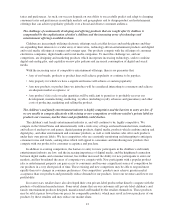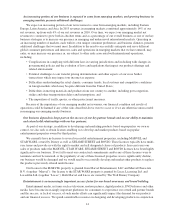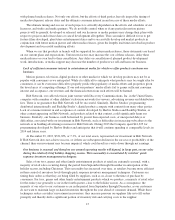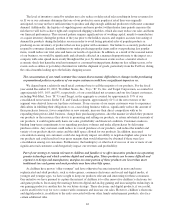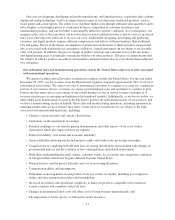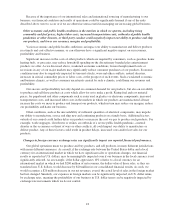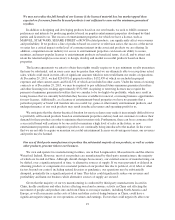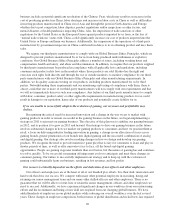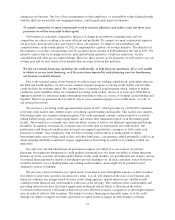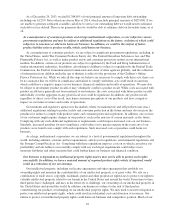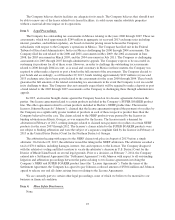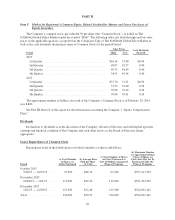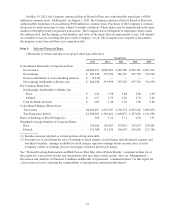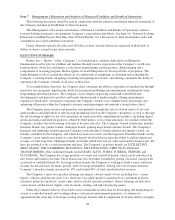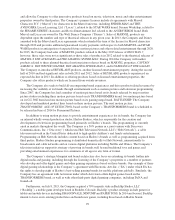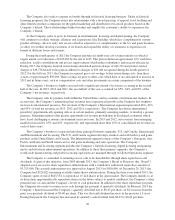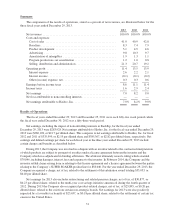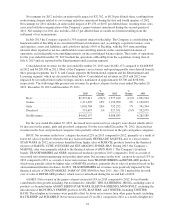Hasbro 2013 Annual Report Download - page 34
Download and view the complete annual report
Please find page 34 of the 2013 Hasbro annual report below. You can navigate through the pages in the report by either clicking on the pages listed below, or by using the keyword search tool below to find specific information within the annual report.As of December 29, 2013, we had $1,384,895 of total principal amount of long-term debt outstanding,
including our 6.125% Notes which are due in May of 2014, which include principal amounts of $425,000. If we
are unable to generate sufficient available cash flow to service our outstanding debt we would need to refinance
such debt or face default. There is no guarantee that we would be able to refinance debt on favorable terms, or at
all.
As a manufacturer of consumer products and a large multinational corporation, we are subject to various
government regulations and may be subject to additional regulations in the future, violation of which could
subject us to sanctions or otherwise harm our business. In addition, we could be the subject of future
product liability suits or product recalls, which could harm our business.
As a manufacturer of consumer products, we are subject to significant government regulations, including, in
the United States, under The Consumer Products Safety Act, The Federal Hazardous Substances Act, and The
Flammable Fabrics Act, as well as under product safety and consumer protection statutes in our international
markets. In addition, certain of our products are subject to regulation by the Food and Drug Administration or
similar international authorities. In addition, advertising to children is subject to regulation by the Federal Trade
Commission, the Federal Communications Commission and a host of other agencies globally, and the collection
of information from children under the age of thirteen is subject to the provisions of the Children’s Online
Privacy Protection Act. While we take all the steps we believe are necessary to comply with these acts, there can
be no assurance that we will be in compliance and failure to comply with these acts could result in sanctions
which could have a negative impact on our business, financial condition and results of operations. We may also
be subject to involuntary product recalls or may voluntarily conduct a product recall. While costs associated with
product recalls have generally not been material to our business, the costs associated with future product recalls
individually or in the aggregate in any given fiscal year could be significant. In addition, any product recall,
regardless of direct costs of the recall, may harm consumer perceptions of our products and have a negative
impact on our future revenues and results of operations.
Governments and regulatory agencies in the markets where we manufacture and sell products may enact
additional regulations relating to product safety and consumer protection in the future and may also increase the
penalties for failure to comply with product safety and consumer protection regulations. In addition, one or more
of our customers might require changes in our products, such as the non-use of certain materials, in the future.
Complying with any such additional regulations or requirements could impose increased costs on our business.
Similarly, increased penalties for non-compliance could subject us to greater expense in the event any of our
products were found to not comply with such regulations. Such increased costs or penalties could harm our
business.
As a large, multinational corporation, we are subject to a host of governmental regulations throughout the
world, including antitrust, customs and tax requirements, anti-boycott regulations, environmental regulations and
the Foreign Corrupt Practices Act. Complying with these regulations imposes costs on us which can reduce our
profitability and our failure to successfully comply with any such legal requirements could subject us to
monetary liabilities and other sanctions that could further harm our business and financial condition.
Our business is dependent on intellectual property rights and we may not be able to protect such rights
successfully. In addition, we have a material amount of acquired product rights which, if impaired, would
result in a reduction of our net earnings.
Our intellectual property, including our license agreements and other agreements that establish our
ownership rights and maintain the confidentiality of our intellectual property, is of great value. We rely on a
combination of trade secret, copyright, trademark, patent and other proprietary rights laws to protect our rights to
valuable intellectual property related to our brands in the United States and around the world. From time to time,
third parties have challenged, and may in the future try to challenge, our ownership of our intellectual property in
the United States and around the world. In addition, our business is subject to the risk of third parties
counterfeiting our products or infringing on our intellectual property rights. We may need to resort to litigation to
protect our intellectual property rights, which could result in substantial costs and diversion of resources. Our
failure to protect our intellectual property rights could harm our business and competitive position. Much of our
22


